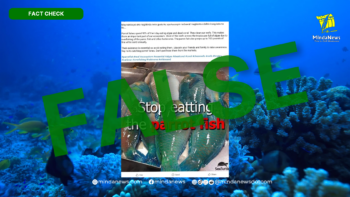COTABATO CITY (MindaNews/30 March) — There’s just something about being euphoric that’s eerie. We just can’t shake off our penchant for pomp and revelry like what we just witnessed over the signing of the FAB and the CAB. I compare it to eating till our tummies burst at any rare opportunity because “banat ta kaon ron kay ugma gutom” (binge now because tomorrow we’d be hungry again). We love to strut our stuff for the opportunity to be identified with the high and mighty, opportunity to have a share in the big pie of other people’s money. When the real work resumes — well, there’s a million opportunities to work. Who would want a million opportunities when it entails work…?
Moderation has never been our best assets. Filipino or human nature — go figure.
(Don’t worry. I know a handful who were there squirming to get things over with).
I do have a question: How do you really discuss a seemingly complex concept like a peace process to someone who haven’t had the opportunity for proper schooling?
Given enough time, I can look up for you all these data showing how low the literacy level of Mindanao is, let alone ARMM (the core area of the Bangsamoro). Again, nitpicking on these numbers is the best way to kill time. We all have come across it at different points anyway. How much more research do we need. Tell me if you do not get blank stares when you talk about the peace process to someone in the logged-over mountains or silted marshes of Maguindanao.
Going back: What exactly are my hopes and fears now that the parties have formally signed the Comprehensive Agreement on the Bangsamoro? Is this agreement already THE Peace agreement many have been anticipating for so long?
There’s the danger. I too, shared in the euphoria. When the FAB was signed in October 2012, it sent mixed messages. Reports reaching our office say that individuals (who are not IPs) came in droves to tell the IPs (Teduray & Lambangian) communities that they are taking back “their” land because “the peace agreement was already signed”.
We have forwarded these reports to respective duty holders (state agencies) for verification and action.
These are the handful of strategies being used. There could be more:
One: Groups of 20-40 individuals bring seedlings of coconut, african palm and banana to a piece of land they like. They clear that piece of land and plant these seedlings, alongside with corn. Their leader, usually armed, tell the IPs not to worry because they’re just planting crops anyway. But historically, once the seeds/seedlings are planted, the non-IPs fight for their stake. In the words of an IP: “Tinitiro lang kami na parang manok. Buti pa ang manok may halaga.” (We are shot at like chickens. Good for the chicken because it has monetary value)
Let us not forget that alongside armed invasion, Mindanao was also conquered through population transfer. Vast tracts of land were awarded by the state to corporations; and also to people of Luzon and the Visayas who were slaves in their own lands; landless people who were willing to clear forests with their bare hands, plant crops and stake their claim. What the IPs are experiencing now is localized neo-colonialism.
Two: The IPs (again in the context of this article Teduray, Lambangian & Dulangan — lest we go into splitting hairs over definitions) are made to sign some form of consent for the entry of bananas and african palm or what have you so that their lives will be better. Haven’t we heard the same promises about sugar and pineapples decades back? Oh, yes. For everyone who became a millionaire there are thousands who barely live on a daily wage.
Three: Non-IPs engage in armed clashes in the guise of rido (clan feud). The IPs, always the non-confrontational lot, sidestep. The sidestep is often many strides — towards some safe haven like a river delta, a cove, or deeper into the forest. They usually don’t join evacuation centers as they feel discriminated upon even in those conventional places of refuge. But alas, once they return to their place of origin, somebody else owns it and usually brandishes some kind of paper to show “proof”.
Four: Peace agreements are signed and promoted to say it will bring in a windfall of investments and foreign aid. Whether the billions of dollars from a previous agreement that was poured on the blood-stained lands of Mindanao ever impacted positively to the people’s lives is another story. And we’re not talking about accounting yet.
Are so called peacemakers and peacebuilders discussing the aforementioned in the open? Maybe yes and I haven’t come across it as a formal agenda. Everything just gets lost in translation and my comprehension is just up to the level of many who are living in those logged over hills or silted marshes.
I’m not stating specific ethnic affiliations as there are quite a number among us who cannot take the issue with a straight face. But, if you take time to thresh out your thoughts, apply where applicable. You would know what I’m talking about. (Unless you live in Mars).
The lack of trust the IPs have over peace agreements have basis. IPRA as a law is a peace agreement that is taking eternity to implement in the ARMM. Right after the GRP-MNLF peace agreement, the GRP awarded thousands of hectares of forest land (IP territory) to the MNLF. I find the IPs’ proactive engagement in the current peace process magnanimous. Despite this lack of trust, they persevered. Unarmed. Their mantra: “Participate. Or Perish.” I pray that by the time they get their end of the (fairest) deal, they won’t become the next oppressors.
Generally there’s a prevailing feeling of “anything except war” over peace agreements. I suppose this comes as a result of propaganda-savvy strategies acquired by most players: smother the general public with feel good slogans and statements and that’s all the education they need to get.
And the cycle resumes.
(MindaViews is the opinion section of MindaNews. Aveen Acuna-Gulo wrote a column, “The Voice” for the Mindanao Cross from 1991 to 2006. She likes to challenge stereotypes. “Don’t worry about my opinions,” she says.”It won’t make a dent to the conventional.”)







